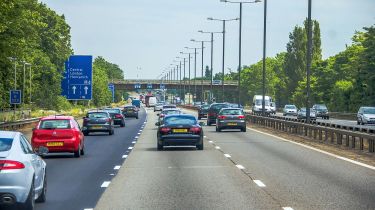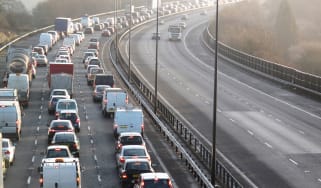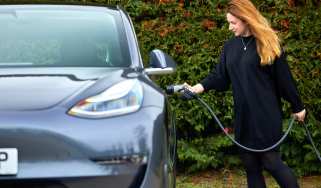UK government urged to consider pay-per-mile road pricing to replace fuel duty and VED
UK Transport Committee has recommended the introduction of a road pricing scheme to replace the current vehicle excise and fuel duty levies

- Taxation changes would also affect electric cars
- Claimed tax revenue changes would see most drivers paying the same or less
- UK aims to be carbon-neutral by 2050
The government’s Transport Committee wants a shake-up of the current vehicle excise duty (VED) and fuel duty system, in order to fill the gap created by zero-emission cars. Electric and hydrogen cars currently incur no fuel duty and are free to tax, but this could change as the government is being urged to replace the current system with pay-per-mile road pricing.
This proposed road pricing system would not only consider how many miles you drive per year, but also the type of vehicle you drive and the times that you’re on the road. Like an electricity tariff, road pricing may be cheaper at less congested times, such as overnight.
 The 10 best electric cars in 2025
The 10 best electric cars in 2025
Electric cars are currently exempt from vehicle excise duty (VED, which is often referred to as road tax), and they aren’t subject to fuel duty like petrol and diesel cars. This adds up to a potential loss of £35bn, the Transport Committee says.
The committee suggests that both fuel duty and VED should be replaced with pay-per-mile road pricing, while ensuring that motorists pay the same or less than they do currently. It also states that any road pricing system that is introduced should consider the impact of per-per-mile charging on vulnerable groups and those who live in rural areas.

Huw Merriman MP, Chair of the Transport Committee, said: “We need to talk about road pricing. Innovative technology could deliver a national road-pricing scheme which prices up a journey based on the amount of road, and type of vehicle, used. Just like our current motoring taxes but, by using price as a lever, we can offer better prices at less congested times and have technology compare these directly to public transport alternatives. By offering choice, we can deliver for the driver and for the environment. Road pricing should not cost motorists more, overall, or undermine progress on active travel.”
“Work should begin without delay. The situation is urgent. New taxes, which rely on new technology, take years to introduce. A national scheme would avoid a confusing and potentially unfair and contradictory patchwork of local schemes but would be impossible to deliver if this patchwork becomes too vast. The countdown to net zero has begun. Net zero emissions should not mean zero tax revenue.”
What does it mean for car buyers?
Sales of new petrol and diesel cars are to be banned from 2030, and the government is keen to accelerate the take-up of electric cars in particular. However, recent cuts to the plug-in car grant, and the removal of the home wallbox grant scheme at the end of March 2022 mean that the proposed taxation changes could potentially dissuade buyers from switching to an EV.
The Transport Committee says that incentives must remain in place to get drivers to make the switch to electric cars, although it’s not clear yet what these incentives will look like in the future.
Read our guides to the cheapest electric cars and the best plug-in hybrid cars
Recommended

Beat the Easter weekend traffic: secrets of a stress-free car getaway

Suzuki’s new 10-year warranty is free – here’s how to get it

Company car tax 2025: benefit-in-kind (BiK) rates explained
Most Popular

Suzuki’s new 10-year warranty is free – here’s how to get it

Omoda E5 targets rivals: now with zero deposit and APR
Tips & advice

Car dashboard warning lights: what does each symbol mean?

Electric car charging stations: public networks, charger types, apps and maps








